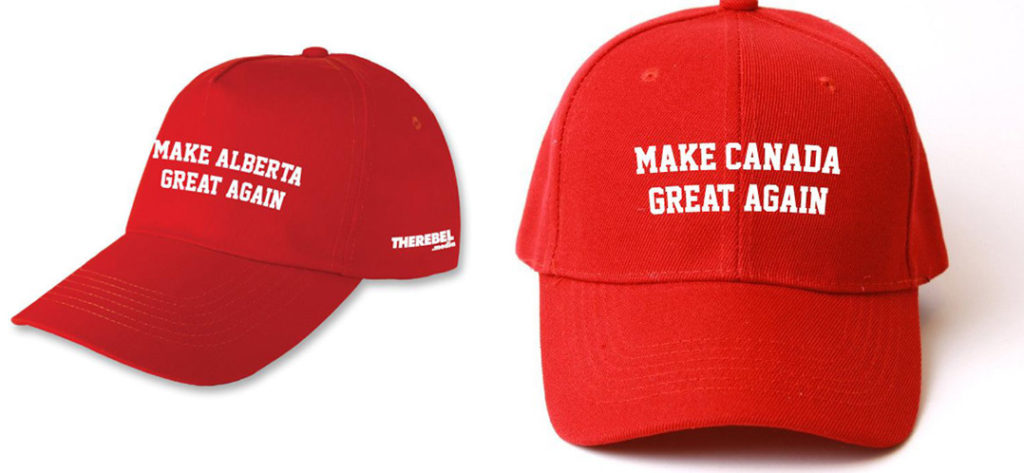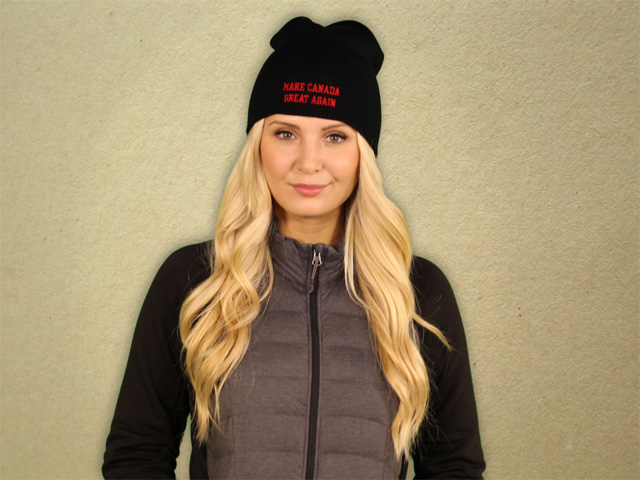
Ezra Levant’s Rebel Media is taking the Hudson’s Bay Company to court for trademark infringement over the Canadian retailer’s alleged unauthorized use of the slogan “Make Canada Great Again.”
In a statement of claim filed in the Federal Court of Canada in Montreal on May 24, Rebel News Network Ltd. alleges that Hudson’s Bay sells, among other things, hats carrying the slogan which the Rebel applied to trademark in November 2016. According to the Canadian Trademarks Database, the mark was approved earlier this year and registered on March 5, 2019.
The Rebel claims it has been using the mark “continuously and extensively” in Canada “since at least as early as February 15, 2015” — shortly after the site launched, and four months before Donald Trump began his 2016 presidential campaign — in association with services such as radio and television programs, podcasts, and online programming. The mark also covers goods including bumper stickers, lawn and window signs, shoulder bags, pens, mugs, t-shirts, and hats. The Rebel has also registered “Make Alberta Great Again.”
“Plaintiff has acquired substantial goodwill in the Make Canada Great Again registered trade-mark,” the claim states. “Plaintiff has also rigorously defended its rights in the Make Canada Great Again registered trade-mark since it introduced the brand in Canada. As a result, the Make Canada Great Again registered trade-mark is recognized throughout Canada as distinguishing Plaintiff’s goods and services from those of others.”
The Rebel’s lawyers declined comment when contacted by Canadaland. “Unfortunately, we do not comment on any of our ongoing cases,” Catherine Thall Dubé with Montreal’s Robic LLP stated in an email.
The lawsuit gives no timeline for HBC’s alleged infringing activities, but says the company’s use of the slogan “in association with hats is likely to confuse consumers as to the relationship or origin of the parties’ respective products, which are identical.”

In October 2018, the retailer announced it was pulling the hats from shelves after a “backlash” erupted online, a controversy reignited a few months later when the hats were spotted in HBC’s flagship store in downtown Vancouver. At the time, Levant claimed he was “outraged” not by the slogan, but as the owner of the trademark, spurring him to a send a cease-and-desist letter to HBC, which the company allegedly “ignored.” The product is no longer displayed at its former url on the Bay’s website.
“Considering Defendant’s continued infringement despite being aware of the Plaintiff’s registered trade-mark rights, Defendant is likely to continue its infringing activities,” the claim states. “By reason of the illegal activities set out above, Defendant has made and continues to make unjust profits and Plaintiff has suffered and continues to suffer damages.”
The Rebel seeks unspecified damages for trademark infringement, its monetary claim exceeding $50,000.
While it’s unclear why The Rebel targeted the retailer rather than the manufacturer, the Los Angeles Trading Company in HBC’s case, a simple Google search of the term “Make Canada Great Again” turns up several pages offering similar apparel for sale, including sellers on Amazon and Redbubble. Other products popular with MCGA hat buyers on Amazon include shirts emblazoned with the slogans “Make Trudeau a Drama Teacher Again” and “White Straight Conservative Christian – How Else May I Offend You?”
Neither the Hudson’s Bay Company nor Levant responded to requests for comment.
“With trademarks, what you’re receiving is the right to use a certain mark in association with certain goods or services,” explains Graham Reynolds, an associate professor at the University of British Columbia’s Peter Allard School of Law. “So it’s not seen as sort of broad ownership over the mark itself, just that you are the party that has the exclusive rights to use that mark.”
He says a party accused of trademark infringement can defend themselves in a number of ways, such as arguing the mark is not registrable under the act or is improperly registered. However, unlike in copyright law, there’s no “fair dealing” defence for trademark infringement.
“It’s a very different type of right than copyright, even though they’re both considered to be rights that fall under the umbrella of intellectual property,” he says. “Copyright is granted in part to reward authors to promote the public interest in the creation and dissemination of works of the arts and intellect, trademarks are granted in order to assist consumers in purchasing goods, as well as to protect the development of individual brands.”
“I think that the fact that the [‘Make Canada Great Again’] slogan is tied to the slogan that’s used in the U.S. would make it a notable case, but in some ways it seems like a standard trademark-infringement lawsuit,” he adds.
Updated at 9:05 p.m. EDT on May 30, 2019, to add observations from Graham Reynolds and to note that Ezra Levant did not respond to a request for comment.
Top images of products formerly displayed for sale on The Rebel’s Shopify web store.